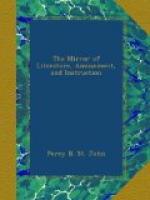“Rudolf Donnerhugel is desirous to give the young merchant, Arthur Philipson, the opportunity of finishing the bargain which remained unsettled between them in the castle-court of Geierstein. He is the more desirous of this, as he is aware that the said Arthur has done him wrong, in seducing the affections of a certain maiden of rank, to whom he, Philipson, is not, and cannot be, any thing beyond an ordinary acquaintance. Rudolf Donnerhugel will send Arthur Philipson word, when a fair and equal meeting can take place on neutral ground. In the meantime, he will be as often as possible in the first rank of the skirmishers.”
Young Arthur’s heart leapt high as he read the defiance, the piqued tone of which showed the state of the writer’s feelings, and argued sufficiently Rudolf’s disappointment on the subject of Anne of Geierstein, and his suspicion that she had bestowed her affections on the youthful stranger. Arthur found means of dispatching a reply to the challenge of the Swiss, assuring him of the pleasure with which he would attend his commands, either in front of the line or elsewhere, as Rudolf might desire.
They met, as was the phrase of the time, “manful under shield.” The lance of the Swiss glanced from the helmet of the Englishman, against which it was addressed, while the spear of Arthur, directed right against the centre of his adversary’s body, was so justly aimed, and so truly seconded by the full fury of the career, as to pierce, not only the shield which hung round the ill-fated warrior’s neck, but a breastplate, and a shirt of mail which he wore beneath it. Passing clear through the body, the steel point of the weapon was only stopped by the backpiece of the unfortunate cavalier, who fell headlong from his horse, as if struck by lightning, rolled twice or thrice over on the ground, tore the earth with his hands, and then lay prostrate a dead corpse.
There was a cry of rage and grief among those men-at-arms whose ranks Rudolf had that instant left, and many couched their lances to avenge him; but Ferrand of Lorraine, who was present in person, ordered them to make prisoner, but not to harm the successful champion. This was accomplished, for Arthur had not time to turn his bridle for flight, and resistance would have been madness.
When brought before Ferrand, he raised his visor, and said, “Is it well, my lord, to make captive an adventurous Knight, for doing his devoir against a personal challenger?”
“Do not complain, Sir Arthur of Oxford,” said Ferrand, “before you experience injury.—You are free, Sir Knight. Your father and you were faithful to my royal aunt Margaret, and although she was my enemy, I do justice to your fidelity in her behalf; and from respect to her memory, disinherited as she was like myself, and to please my grandfather, who I think had some regard for you, I give you your freedom. But I must also care for your safety during your return to the camp of Burgundy. On this side of the hill we are loyal and true-hearted men, on the other they are traitors and murderers.—You, Sir Count, will, I think, gladly see our captive placed in safety.”




